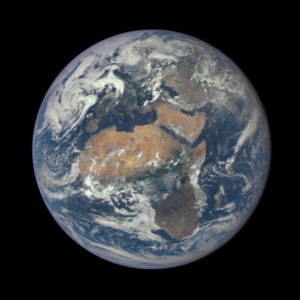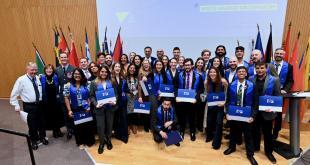
Centre national d’études spatiales (CNES) President Jean-Yves Le Gall was at the 4th Committee on Space Research (COSPAR) symposium that is taking place in Herzliya, Israel, from Monday 4 to Friday 8 November 2019 on the theme of “Small Satellites for Sustainable Science and Development.”
Formed in 1958, COSPAR is an international organization charged with promoting space research. It serves chiefly as a forum for information exchange, preparation of scientific and technical standards, and the presentation and publication of scientific papers in the field of space research. It organizes its symposium on a theme of international interest every two years.
Jean-Yves Le Gall spoke during the roundtable discussion on “Opportunities for International Cooperation in Space Research Using Small Satellites” alongside heads of space agencies from around the world. He began by recalling the fundamentals on which CNES is built. For more than 50 years, the agency has made international cooperation the core of its strategy, forging longstanding partnerships with traditional space powers and New Space players alike. CNES has established relationships of trust at the highest levels to affirm its vocation to reach out to the rest of the world. Oceanography missions with India, astrophysics missions with China, vegetation monitoring missions with Israel, Mars exploration and ocean altimetry missions with the USA and support and development work for the United Arab Emirates’ hyperspectral nanosatellite are just a few examples of this tradition of cooperation furthered by CNES.
Nanosatellites are clearly paving the way for new science mission concepts. Thanks to their low cost and lean development processes, nanosatellite science missions are ideally suited to fostering international cooperation in the field of research and to working with academia and industry. They offer unique new ways of observing and measuring compared to traditional technologies.
Today, many missions based on nanosatellites are under study to provide a technological and civic response to the challenge of tackling climate change, a field where France is leading the way with the Space Climate Observatory (SCO). This organization will enable governments, regional decision-makers and supranational bodies to keep track of the impacts of climate change in real time and to develop climate-resilient policies.
On the sidelines of this symposium, Jean-Yves Le Gall met Avi Blasberger, Director General of the Israel Space Agency (ISA), to discuss current and future joint projects and in particular the French-Israeli VENµS missions that the ISA is proposing to include in the SCO and the Cluster for Climate and Cloud Imaging of Evolution and Lightning (C3IEL) mission identified as a priority at CNES’s latest Science Survey Seminar.





